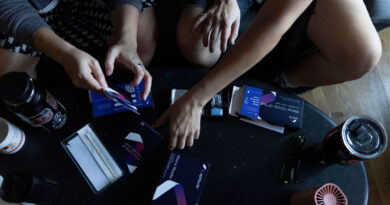Covid-19 mourners are turning to Facebook for grief support

Brian Walter was wracked with guilt after his father died from Covid-19 in May. Walter was a New York City Transit employee who had kept working as the coronavirus surged across the city in the spring and he worried he was responsible.
“One of my personal struggles is worrying about the fact that I may have brought it into the house,” said Walter, 46, who lived with his parents in Queens and tested positive for the virus around the same time as his father.
He turned to Facebook looking for someone who might understand and soon discovered he was not alone. After a few clicks, he joined Covid-19 Loss Support for Family & Friends, a Facebook bereavement group, where members share their struggles with grief. Today, the group has close to 3,000 members.
The pandemic has upended traditional grieving, leaving mourners feeling isolated. For many Covid-19 mourners, the loss of funerals and memorial services has left them unable to feel a sense of closure and say goodbye to loved ones — an integral part of the grieving process. Some have found solace among other Covid-19 mourners in Facebook groups.
“In relation to pandemic grief specifically, we need the heartfelt companionship of others who have walked the same road,” said Robert Neimeyer, director of the Portland Institute for Loss and Transition. “That’s something the [Facebook] group can provide.”
When Sabila Khan’s 76-year-old father succumbed to the virus in April, she posted on Survivor Corps, a group specializing in educating coronavirus survivors, and asked if a Covid-19-specifc Facebook bereavement group existed. Nobody knew. So, with the help of another Survivor Corp member, Angelina Proia who also lost her father to the virus, the two created Covid-19 Loss Support for Family & Friends.
“As much as my community, my family and friends were reaching out on social media and on the phone, all I wanted to do was to talk to other people who were going through what I was going through,” said Khan, 41, who works in book publishing.
Khan’s father, Shafqat Khan, a community organizer who brought together communities after 9/11, died in a hospital three blocks away from his daughter’s home in Jersey City, New Jersey, without his family by his side. That left Sabila Khan with deep feelings of isolation.
“Covid grief is a different beast because of the circumstances in which many of our loved ones passed,” she said. “My father isn’t the only one who died alone, and he wasn’t the only one whose burial was livestreamed.”
In the group, members share their experiences coping with grief. While some post photos of their loved ones and frequently comment, others find comfort in reading the discussions and relating to the pain.
Aaron Burch, a group member from Michigan, lost his mother, Cheryl Burch, after a 51-day battle with the virus in June. Burch, whose mom was on a ventilator when he told her she was going to be a grandmother, said not getting the chance to say goodbye haunts him. He said he sees hospital tubes when he closes his eyes at night.
It’s a relatable pandemic-specific experience for many other mourners.
“I have the ability to talk about my feelings of doubt, grief and sadness,” he said. “People are there to validate that and tell me that I’m not alone for it.”
For Jennifer Whitworth, whose mother, Teresa Kelley, died at the end of June, the group is a safe haven.
“It’s given us a place to talk about what happened when nobody else can understand,” said Whitworth, 46, of Georgia.
Jane Dorlester, a Brooklyn-based clinical social worker with experience in group counseling, said Covid-19 mourners share a sense of understanding.
“It’s the attitude of feeling victimized by it. ‘Why did it happen to me?’ So, I can imagine there would be some comfort in the idea that 2,999 have also had this loss,” she said. “There would be some comfort in understanding they are not alone in this loss.”
For the past several weeks, Whitworth has attended Sunday Zoom sessions with about 10 other group members where topics range from weekly updates to frustrations with coronavirus conspiracy theories. Many of the members who spoke with NBC News reported frequent run-ins with people skeptical of the virus.
In June, as Walter waited for a breakfast sandwich at a local deli, a customer and cashier called the coronavirus “bull—-” a dozen times and the cashier said he “can’t wait to get back to playing golf,” said Walter. When they turned to Walter expecting agreement, he said, “If it was fake then my dad could stop pretending he was dead and come back.”
Many other members have talked of having similar experiences.
Marla Sarrel, a second grade teacher in New Jersey, said she’s received insensitive comments surrounding her husband’s death to Covid-19. “You know if someone dies of cancer, it’s, ‘Oh I’m so sorry. Did they suffer?’ When you say your loved one died of Covid, the first question is, ‘Did they have underlying conditions?’ It shouldn’t matter,” said Sarrel, whose husband, Louis, died four months shy of their 30th anniversary. “That’s the first question everyone says.”
While the group has a strict no political posts policy, such comments erupted after President Donald Trump called his fight with Covid-19 “a blessing from God.”
“When he tweeted after he was feeling great and it was such a blessing, oh my God, it blew up on our page,” said Kristy Bengivenga, a member whose husband, Edward, died in August. “People were so upset about it; it was a trigger.”
For Fiana Tulip, the government’s response to the virus led her to political activism. In July, after the death of her mother, Isabelle Papadimitriou, a respiratory therapist, Tulip wrote a letter in The Austin American-Statesman inviting Texas Gov. Greg Abbott to her mother’s funeral. Abbott issued a mask mandate only two days before her death. Fueled by grief, Tulip created I Lost My Loved One(s) to Covid-19, a Facebook group that welcomes political-related posts.
“The death numbers are so high because of politics. … Trump’s decisions made it political,” said Tulip, who is also a member of Marked by Covid, a social media campaign to hold politicians accountable that was started by Kristin Urquiza after her father died from the virus at the end of June.
Recently, Tulip put together a vigil in Times Square commemorating the people lost to the pandemic and sought family photos from group members. Debra McCoskey-Reisert sent in a picture of her 55-year-old brother, Bobby, who died from the virus in an Indiana nursing home. “My brother is not a number,” McCoskey-Reisert said. “He is Bobby McCoskey … and now with what Fiana did, he’s a face, he’s real.”
The gesture from a stranger turned a bad day around, she said.
“We’re in this together with our journey of grief now. There’s beautiful people like Fiana who did that … who would take pictures from strangers and do that,” she said, her voice cracking.
Grieving is always hard and Neimeyer said that seeking the support of others can ease the process.
“It is helpful to be able to join a community of people who are contending with similar baggage and they are attempting to move forward despite it,” he said. “I think largely these are very helpful groups in overcoming some serious risk factors for a grief that is immensely complicated in the pandemic circumstances in which we suffer.”
As the pandemic continues to claim lives — more than 228,000 in the United States as of Thursday — dozens of new members are joining Khan’s bereavement group daily. “There are days when the grief feels completely debilitating and overwhelming,” Khan said. “And this group has truly kept me afloat. It’s given me a sense of purpose.”
In recent weeks, Walter attended National Covid-19 Remembrance Day in Washington, where he briefly spoke about his battle with survivor’s guilt and connected with another member — this time in person.
“I’ve definitely made some great friends,” Walter said. “I would give absolutely anything not to be involved in this whatsoever, but the fact that I can’t undo that … this is the next best thing.”
*** This article has been archived for your research. The original version from NBC News can be found here ***


